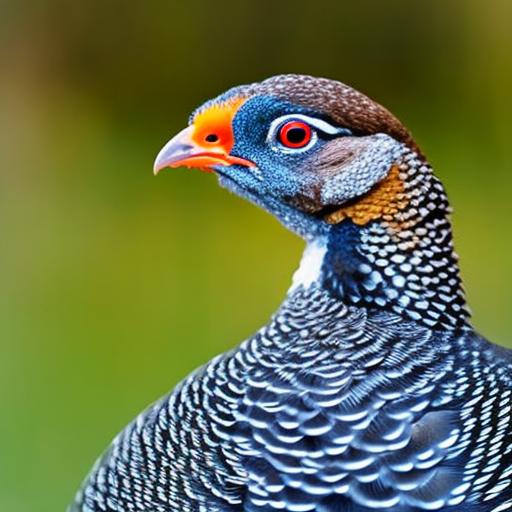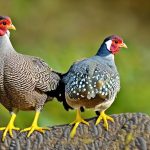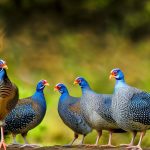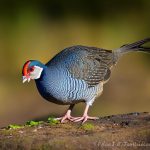Guinea fowl, also known as pintades, are a unique and fascinating addition to any poultry flock. They are native to Africa and have been domesticated for thousands of years. Guinea fowl are known for their distinctive appearance, with speckled feathers and a helmet-like crest on their heads. They are also valued for their ability to control pests such as ticks, flies, and even snakes, making them a popular choice for organic pest control on farms and homesteads.
Keeping guinea fowl can be a rewarding experience, but it requires careful planning and consideration. These birds have specific needs and behaviors that must be taken into account when setting up their environment and caring for them. In this article, we will explore the various aspects of guinea fowl keeping, including housing, feeding, health management, breeding, and protection. Whether you are a seasoned poultry keeper or a beginner looking to add guinea fowl to your flock, this comprehensive guide will provide you with the information you need to successfully raise and care for these unique birds.
Key Takeaways
- Guinea fowl are low-maintenance birds that are great for pest control and can be kept for meat or eggs.
- When choosing housing for guinea fowl, consider their need for shelter, roosting space, and protection from predators.
- Guinea fowl require a balanced diet of grains, seeds, insects, and greens to thrive.
- Regular health checks, vaccinations, and proper sanitation are essential for preventing diseases in guinea fowl.
- Breeding guinea fowl requires a suitable nesting area, proper mating ratio, and careful monitoring of the hatching process.
Choosing the Right Housing for Guinea Fowl
When it comes to housing guinea fowl, there are several important factors to consider. First and foremost, guinea fowl are highly social birds and should be kept in groups of at least six to eight individuals. They are also known for their strong flying abilities and prefer to roost in trees at night, so providing them with ample space to roam and fly is essential. A spacious outdoor enclosure with plenty of room to forage and explore is ideal for guinea fowl.
In addition to outdoor space, guinea fowl also require a secure shelter to protect them from predators and the elements. A sturdy coop or shelter with roosting bars and nesting boxes will provide them with a safe place to rest and lay eggs. It’s important to ensure that the housing is predator-proof, as guinea fowl are vulnerable to attacks from predators such as foxes, raccoons, and birds of prey. Providing a secure fencing around the enclosure and using predator-proof latches on doors and windows can help keep guinea fowl safe from harm. Overall, providing a spacious outdoor enclosure with a secure shelter is essential for the health and well-being of guinea fowl.
Feeding and Nutrition for Guinea Fowl
Proper nutrition is crucial for the health and well-being of guinea fowl. These birds are omnivores and have a varied diet that includes insects, seeds, grains, and vegetation. In the wild, guinea fowl spend much of their time foraging for food, so it’s important to provide them with access to a diverse range of foods in captivity. A high-quality commercial poultry feed can serve as the foundation of their diet, supplemented with fresh fruits and vegetables, grains, and protein sources such as mealworms or crickets.
In addition to their main diet, guinea fowl also require access to grit and calcium to aid in digestion and eggshell formation. Grit helps grind up food in their gizzards, while calcium is essential for producing strong eggshells in laying hens. Providing access to a separate container of grit and crushed oyster shells will ensure that guinea fowl have access to these essential nutrients. It’s also important to provide fresh, clean water at all times, as guinea fowl can quickly become dehydrated, especially in hot weather.
Overall, a well-balanced diet that includes a variety of foods will help keep guinea fowl healthy and thriving. Monitoring their food intake and adjusting their diet as needed based on their activity level and reproductive status will help ensure that they receive the nutrition they need to thrive.
Health and Disease Management for Guinea Fowl
Maintaining the health of guinea fowl is essential for their overall well-being and productivity. Like all poultry, guinea fowl are susceptible to a range of diseases and health issues that can impact their quality of life. Regular health checks and preventative measures can help keep guinea fowl healthy and disease-free.
One of the most important aspects of guinea fowl health management is vaccination. Vaccinating guinea fowl against common poultry diseases such as Newcastle disease and fowl pox can help prevent outbreaks and protect the flock from illness. It’s important to work with a veterinarian or poultry health professional to develop a vaccination schedule that meets the specific needs of your flock.
In addition to vaccination, good hygiene practices are essential for preventing disease in guinea fowl. Keeping their living environment clean and dry, regularly removing droppings, and providing clean water and feed can help reduce the risk of disease transmission. Monitoring the flock for signs of illness such as lethargy, decreased appetite, or respiratory issues can help identify potential health problems early on.
Overall, proactive health management practices such as vaccination, good hygiene, and regular health checks can help keep guinea fowl healthy and thriving.
Breeding and Reproduction of Guinea Fowl
Breeding guinea fowl can be a rewarding experience for poultry keepers. Guinea fowl are known for their strong breeding instincts and can be prolific layers under the right conditions. When it comes to breeding guinea fowl, there are several important factors to consider.
First and foremost, providing a suitable nesting area is essential for successful breeding. Guinea fowl prefer to lay their eggs in secluded areas such as tall grass or brush piles, so providing them with access to these types of nesting sites can encourage natural breeding behavior. Additionally, providing nesting boxes in the coop can give guinea hens a safe place to lay their eggs and protect them from predators.
Once the eggs are laid, it’s important to provide proper incubation conditions if you want to hatch the eggs naturally. Guinea fowl eggs require consistent warmth and humidity for successful incubation. If natural incubation is not an option, using an artificial incubator can also be successful in hatching guinea fowl eggs.
Overall, providing suitable nesting areas and proper incubation conditions can help encourage successful breeding and reproduction in guinea fowl.
Predation and Protection for Guinea Fowl

Predation is a major concern for guinea fowl keepers, as these birds are vulnerable to attacks from a wide range of predators including foxes, raccoons, dogs, cats, birds of prey, and even snakes. Protecting guinea fowl from predators requires careful planning and implementation of effective predator control measures.
One of the most effective ways to protect guinea fowl from predators is by providing a secure housing structure. This includes using sturdy fencing around the outdoor enclosure, as well as predator-proof latches on doors and windows of the coop. Additionally, using motion-activated lights or sound devices can help deter nocturnal predators from approaching the enclosure.
Another effective predator control measure is using guardian animals such as dogs or geese to protect the flock. These animals can help deter predators from approaching the enclosure and provide an added layer of protection for the guinea fowl.
Overall, implementing a combination of secure housing structures, predator deterrents, and guardian animals can help protect guinea fowl from predation and ensure their safety.
Tips for Successful Guinea Fowl Keeping
Successfully keeping guinea fowl requires careful planning and attention to their specific needs. Here are some additional tips for successful guinea fowl keeping:
– Provide ample space: Guinea fowl are highly active birds that require plenty of room to roam and fly. Providing a spacious outdoor enclosure will help keep them healthy and happy.
– Monitor social dynamics: Guinea fowl are social birds that thrive in groups. It’s important to monitor their social dynamics and ensure that they have enough space to establish a pecking order without overcrowding.
– Consider noise levels: Guinea fowl are known for their loud calls, which can be disruptive in residential areas. Consider the noise levels when planning to keep guinea fowl in urban or suburban settings.
– Be mindful of neighbors: Guinea fowl can be curious birds that may wander onto neighboring properties. It’s important to be mindful of neighbors’ boundaries and take steps to prevent conflicts.
– Provide enrichment: Guinea fowl are active foragers that enjoy exploring their environment. Providing enrichment such as dust baths, perches, and natural vegetation can help keep them stimulated.
– Seek veterinary care when needed: If you notice any signs of illness or injury in your guinea fowl, it’s important to seek veterinary care promptly. Working with a veterinarian who has experience with poultry can help ensure that your birds receive the care they need.
In conclusion, keeping guinea fowl can be a rewarding experience for poultry enthusiasts. By providing suitable housing, nutrition, health management, breeding support, protection from predators, and following these tips for successful guinea fowl keeping, you can create a thriving environment for these unique birds on your farm or homestead.
If you’re interested in guinea fowl keeping, you may also want to explore some tips for creating the perfect chicken coop interior. Check out this informative article on PoultryWizard for practical ideas on how to design a comfortable and functional living space for your feathered friends. Understanding the importance of a well-designed coop can help ensure the health and happiness of your guinea fowl and other poultry.
FAQs
What is guinea fowl keeping?
Guinea fowl keeping refers to the practice of raising and caring for guinea fowl, a type of bird that is commonly kept for its meat, eggs, and pest control abilities.
What do guinea fowl eat?
Guinea fowl are omnivorous and will eat a variety of foods including insects, seeds, grains, and small fruits. They are also known to be excellent foragers and will help control pests in the area where they are kept.
What are the benefits of keeping guinea fowl?
Guinea fowl are known for their pest control abilities, as they will eat insects such as ticks, grasshoppers, and even small rodents. They also provide a source of meat and eggs for their keepers.
What kind of housing do guinea fowl need?
Guinea fowl require a secure and predator-proof coop or housing to protect them from predators such as foxes, raccoons, and birds of prey. They also need access to outdoor space for foraging.
Are guinea fowl noisy?
Guinea fowl are known for their loud calls and can be quite noisy, especially during mating season. Keepers should be aware of this and consider their neighbors when deciding to keep guinea fowl.
Do guinea fowl need any special care or attention?
Guinea fowl are relatively low-maintenance birds, but they do require access to clean water, proper nutrition, and protection from predators. They also benefit from regular health checks and vaccinations to prevent diseases.
Meet Walter, the feathered-friend fanatic of Florida! Nestled in the sunshine state, Walter struts through life with his feathered companions, clucking his way to happiness. With a coop that’s fancier than a five-star hotel, he’s the Don Juan of the chicken world. When he’s not teaching his hens to do the cha-cha, you’ll find him in a heated debate with his prized rooster, Sir Clucks-a-Lot. Walter’s poultry passion is no yolk; he’s the sunny-side-up guy you never knew you needed in your flock of friends!







